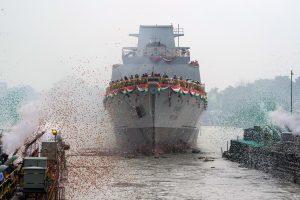In August 2022, given that there had been no incident of attacks on merchant shipping off the coast of Somalia since 2018, industries representing various sectors such as shipping, cargo, tanker, and insurance conveyed their position to the International Maritime Organization (IMO) concerning the removal of the Indian Ocean High Risk Area, effective January 1, 2023.
It did not take too long for the Houthis in Yemen to upend the decision. They started attacking merchant ships in the Red Sea, a global maritime trade route that connects the Indian Ocean with the Mediterranean Sea, and further to Europe, as retaliation against Israel’s attack on Gaza following Hamas’ October 7, 2023 attack on Israel. These attacks have led to soaring oil prices, increased insurance costs, and detours of mercantile marine traffic resulting in a cascading effect on costs and the global economy.
This also puts the United States in a peculiar position, as its attacks on the Houthis in the region have had a negligible effect. The Houthis are aided and abetted by Iran, but the United States does not want to get into a direct conflict or confrontation with Iran, as this might lead to a wider conflict in the region beyond the ongoing Israel-Hamas war that continues to smolder without any end in sight. In this context, it is important to understand the relevance of Iran’s support to the Houthis and the implications of continued strife affecting global shipping and trade.
India, with its traditionally close ties with Iran and its increasing influence in the region, may have a role to play in alleviating this crisis.
Iran’s continued support to Houthis as it attacks ships in the Red Sea could well be another attempt to continue the escalatory spiral between the West and Iran. This needs to be understood against the backdrop of transition day (when the U.N. sanctions of the 2015 Iran nuclear deal lapsed) and the quick imposition of new sanctions by Western countries, mainly led by the United States, in an attempt to target Iran’s ballistic missile and drone programs.
The utilization of Iranian drones, particularly by proxies, is a low-cost option that affords plausible deniability with strategic ramifications in the region. Especially with the conflict that rages between all-weather U.S. ally Israel and the Palestinians in the Gaza strip, this is an opportune moment for Iran, with the United States wary of getting into a direct conflict in an election year. The message for the United States is loud and clear: The more it attempts to corner Iran internationally, first by scuttling the Joint Comprehensive Plan of Action (JCPOA), and then by imposing additional sanctions on Iran’s energy, financial, economic, and defense sectors, the higher Tehran will bounce back through its proxies in the region. This would ultimately help Iran further achieve its objective of widening the wedge between itself and Israel, and the larger Arab world.
China, for its part, smells an opportunity to be a security provider in the region given its close ties with Iran and its reluctance to condemn the Houthi attacks. China does not want to be a part of Operation Prosperity Guardian, the U.S.-led effort to defend shipping in the Red Sea region. Beijing, which has conveyed its support for the Palestinian cause, is more than happy to witness decreasing U.S. influence in the region while projecting itself as a power that needs to be reckoned with. It also does not want to be seen as being aligned with the United States, as would occur if it were to join the U.S.-led coalition to protect shipping in the region. Discrediting the United States, Beijing might want to pursue a more active role in diffusing the Israel-Hamas conflict by acting as an interlocutor with the Arab world, and this would indirectly reduce Houthi attacks on Red Sea shipping.
There is no denying the fact that India is a resident player that occupies nearly 40 percent of the strategic waters of the Indian Ocean. At the same, it is also true that New Delhi, on its own, lacks the capability and capacity to deal with any crises where the lines between state and non-state actors have blurred and shades of grey have emerged.
Times have changed, as today India continues to buy energy from Russia despite sanctions, while it stopped importing crude from Iran following the JCPOA when sanctions were imposed on Iran’s energy and financial sectors. India, with its geopolitical influence and strategic location in the Indian Ocean Region, and possessing a large navy that has exercised with most countries within the region and beyond, can emerge as a major player to become a net security provider.
The 12th edition of the biennial multinational exercise, MILAN 2024, currently taking place from February 19-27 in Visakhapatnam, will see the navies of 50 countries, including Iran, participating. With its theme of “Camaraderie, Cohesion, Collaboration” the Indian Navy, with its partners, aims to work together, collaborate, and respond cohesively as a united and credible force in the region. These exercises help forge bonds with professional interactions as well as cultural, sports, and other activities during the harbor phase. That will go a long way in increasing the synergy between the participating navies toward large force multilateral operations at sea that can act as a deterrent to inimical forces like the Houthis.
Apart from the immediate economic fallout and consequential inflation for some parts of the world, the possible long-term implications of the Red Sea crisis may lead to a deteriorating security situation in the region. The need of the hour today is for like-minded countries to unite, collaborate, and operate in unison to ensure freedom of navigation on the high seas that does not adversely affect maritime trade and security in the region.

































